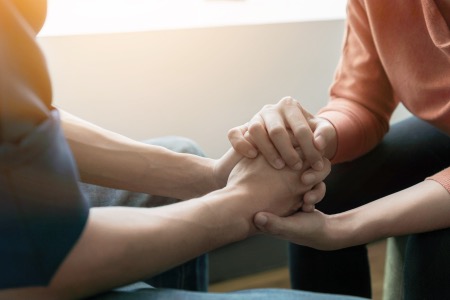Ketamine Addiction Treatment & Rehab
Ketamine is a powerful painkiller and anesthetic, and as its use outside of the medical field, as a popular recreational drug has grown, there is an alarming rate of young people and especially teenagers, using, abusing, and even becoming addicted to Ketamine in the UK.
The long-term physical and mental harm regular use causes make seeking treatment and understanding the options available for yourself or your loved one important. If you feel that you or a loved one are at risk of addiction, please contact our helpline so we can support you through this period.
Understanding Ketamine Addiction
Ketamine gained popularity in the early 2000s as a party drug, and its use has slowly risen in the UK since then. High doses of Ketamine can shift you into an intense, out-of-body state of dissociation, disorientation, and hallucination known as a ‘k-hole’, as these effects become more desirable, your social use may have grown to daily abuse and then addiction.
In cases where there are existing mental health issues, like depression, anxiety, and PTSD or if you have been a victim of childhood trauma, the dissociative effects of ketamine (that is, its ability to induce a lack of responsive awareness to your environment) can increase your risks of addiction. Other drugs are often taken simultaneously (polydrug abuse) with ketamine that increases these effects and decreases your inhibitions towards abuse.
(http://sro.sussex.ac.uk/id/eprint/57391/1/__smbhome.uscs.susx.ac.uk_lh89_Desktop_DeLuca2012.pdf)

Recognising the Signs of Ketamine Abuse
Since the effects of ketamine use are so pronounced but short-lived, you may have been able to hide your use from your family. As your usage becomes heavier or more regular, the build-up of toxins in your body is generally noticeable as:
- Frequent urinary tract infections,
- Memory loss,
- Increased physical injury due to the pain-blocking effects of ketamine
- Tachycardia – increased heart rate
- High blood pressure
- Hyper-excitability
- Agitation
- Unproductive at home or work
- Self-isolation
- Loss of enjoyment and interest in what used to bring you pleasure
- Loss of control
- Depression
- Inability to stay away from Ketamine
- Ignoring the risks you are taking whilst using ketamine
Whilst most of these effects are reversible, the sooner your addiction is treated the better as long-term urinary tract infections cause damage to your bladder, permanent memory loss, and long-term mental health disorders.
Why Ketamine Addiction Treatment is Important
Recreationally, ketamine has considerable addictive potential, it is either ingested, snorted, smoked, or even injected, and although you may not feel that the doses you are taking are harmful, there is a high risk that regular use can cause long-lasting and potentially irreversible damage:
- Ketamine Uropathy describes the damage that ketamine toxins cause to your urinary system, most notably your bladder.
Signs that you may already have KU are:
- Lower abdominal pain ‘K cramps’
- Frequency of urination
- Blood in your urine
- Increased infections in your urinary tract
Sustained use results in a painful fibrotic bladder that may have to be removed if the damage can not be reversed. (https://www.urologynews.uk.com/features/features/post/ketamine-uropathy-an-update)
- Mental impairments, Ketamine abuse has profound effects on both long and short term memory,
- Increased depression,
- Intense anxiety if large doses are taken. This is due to the severe dissociation commonly referred to as a ‘k-hole’ experience – intense detachment to the point that your perceptions appear completely divorced from your reality.
This is the desired effect for some users, but it can be an unpleasant and frightening experience for others.
How does Residential Rehab Work for Ketamines?
A residential rehab programme can aid you in your recovery from detox through to rehabilitation by offering:
- Counseling with therapists – emphasising your ability to change
- Medications – to ease symptoms of withdrawal and minimise the effects of mental illness in the case of a dual diagnosis
- Supportive staff able to monitor your withdrawal 24/7
- Peer support, through group meetings and shared accommodation, helping you realise that you are not alone and you are part of a community.
The most effective programmes have a tailored approach to your addiction treatment and are developed around you and the best course of treatment needed for you.
Medical Assessment
Before detox and rehabilitation can be started, you will have a full medical assessment done with a doctor as well as a trained and highly experienced counselor who will work together to determine the extent of your addiction.
Since the effects of Ketamine use are short-lived, diagnosing your addiction will generally follow the DAST-10 (Drug Abuse Screening Test) questionnaire and assessment:
- Full mental health assessment to determine:
– Your psychological dependence on ketamine
– Any existing mental health issues you may have (this is known as a dual diagnosis) - Full risk assessment.
-What substance(s) are you using? Ketamine is very popular as a party drug and is commonly used with other substances (polydrug abuse)
-What dosage are you taking?
-How frequently are you using ketamine?
-By what route are you administering ketamine(smoking, injecting, swallowing)?
-How long have you been using ketamine?
-Are you aware or concerned about your usage of ketamine?
(https://www.rdash.nhs.uk/wp-content/uploads/2014/04/DAST-10-Policy-v3.2.pdf)
Detox
Detoxification from ketamine is best undertaken in a medical setting like a detox centre, the withdrawal symptoms can occur as quickly as 1 hour after your last dose:
- 1 – 4 hours after stopping:
-cravings begin
-you might find yourself looking for or requesting a ketamine dose (drug hunting); - 4 – 8 hours after stopping:
-anxiety
-shaking
-sweating
-heart palpitations
-low mood
-increased effort required to resist craving - 24 – 48 hours after cessation:
-tiredness
-low appetite
-low mood and increased depression
-Nightmares
-psychosis
If you are suffering from bladder or urinary tract damage from continued use of ketamine, you will require pain management during detox.
Withdrawal symptoms will peak in intensity as your body processes the toxins from ketamine through your kidneys and liver with elimination through your urine. The discomfort you experience is eased when in a supportive, medical environment.
Rehabilitative Therapy
Residential rehabilitation is beneficial to the treatment of addiction and may include a combination of medical care, psychiatric services, counselling, behavioral therapy, vocational training, and other services to best support the whole of you throughout recovery.
Currently, the UK Department of Health recommends a range of therapeutic treatments be available for ketamine addiction rehabilitation, these are provided in conjunction with exercise, meditation, crafts, and nutrition sessions as a non-medical way through recovery.
Cognitive Behavioral Therapy:
This type of therapy helps you to recognise your reactions to environmental and emotional stresses by focusing on learning new ways to cope with the stresses and triggers in your life without Ketamine (https://www.verywellmind.com/what-is-cognitive-behavior-therapy-2795747)
Dialectical behavior therapy (DBT):
Incorporates emotional regulation and mindfulness strategies whilst addressing thoughts and behaviours.
Multimodal Therapy:
Also known as Combination Therapy, where a dual diagnosis is made (mix of mental health issues and substance abuse) there may be a need to treat both issues simultaneously, since trauma, family history, depression, etc may have led you to addiction, just treating the addiction is not enough, your mental health also requires treatment to prevent relapse. (https://www.ncbi.nlm.nih.gov/books/NBK424612/)
Rational emotive behavior therapy (REBT):
Identifies irrational beliefs, actively challenges these beliefs, and teaches you to recognise and change these thought patterns.
Enter your phone number below and one of our qualified addiction specialists will get in touch to discuss your options.

Aftercare & Family Support
Just as addiction doesn’t occur overnight, the recovery phase may take longer than you anticipated, part of the benefits of a private rehab programme is the aftercare and relapse prevention care that is offered, after rehab, you can continue to attend outpatient therapy or private therapy to maintain your new drug-free lifestyle and to lower the chances of relapse.
Families of addicts are often neglected during treatment, but there has been a growing awareness of the roles a support system for families and loved ones of addicts have in healing the family dynamic and thereby providing a healthier environment for the recovering addict.
Most treatment centres include the families of addicts in the recovery process during and after rehab.
Inpatient Alcohol Rehab VS Outpatient Services
Inpatient treatment is done at a residential rehab facility whilst outpatient treatment is offered through private treatment centres, the NHS, and some charity organisations and involves you starting your detox and completing your rehabilitation while still at home.
Pros:
- Cheaper than private facilities
- Less time off work
- Recovery in a familiar environment
- Loved ones can provide care for you
- You are not restricted by rules, such as TV allowance time, smoke breaks, etc
- Privacy
Cons
- Contact with trigger situations
- Having to continue with your day to day responsibilities whilst also experiencing withdrawals
- Medical needs aren’t assessed and monitored 24/7
- You won’t have the same access to support as those offered by residential detox & rehab programmes
- Risk of dehydration
The NHS only offers outpatient care for the treatment of addiction and there can be waiting lists before you may start treatment, so if you require urgent admission, contact us and we will help you find the right private treatment centre for your needs.

Choosing a Treatment Centre
Choosing which facility is best suited to your recovery needs is important, we recognise that if you are engaged in your recovery you are more likely to stick with it and you are welcome to contact our helpline.
Start with a list of your needs:
- Mental and physical health support – if you are aware of an existing condition
-How are the staff trained?
-Are they licensed?
-Are they able to handle a medical emergency?
-Are counselling and medical services offered during detox?
-Does the centre have trained and certified professionals suitable for your treatment? Credible programs should offer a wide selection of evidence-based therapy options to find the right mix for you. The more options, the better your chance at success. - Affordability
-Are the costs covered by health insurance? Are there payment plans available? What are they? - Aftercare and relapse prevention needs
-Will you have access to counselling after rehab? Are there support groups available in your area?
The Care Quality Commission (https://www.cqc.org.uk/) is an independent regulator for health and social care in England, Their team monitor, inspect and regulate services to make sure they meet fundamental standards of quality and safety and publish their findings, including performance ratings to help with choosing treatment centres. You can check the ratings of the treatment centre you are considering at any time before making your choice.
Secondary Treatment
Once your initial treatment (generally a 28-day inpatient programme) has been completed, the need for ongoing support for you and your family is available to facilitate your journey back to living your life free of benzodiazepine.
This is where a Secondary Addiction Care Service can assist you with:
- Reintegration back into your daily life
- Relapse prevention
- Reestablishing a support network within your community and family
- Continuation of therapy
- Rebuilding your daily life skills
Paying for Treatment
In an ideal world, rehab would be free particularly considering the number of people that require treatment, but when you factor in that treatment centres are like staying at a private hotel for 28+ days the costs are understandable.
Some private insurance providers do cover addiction treatment, if you have health insurance, you will need to check what costs are covered and if you will be liable for a copayment. If you are going private with no insurance a payment plan will have to be made, generally, a deposit will be asked for with payment over a couple of installments the final one being on discharge.
For more information on the options available to you, please contact us.
Before Attending Rehab
Whether you are entering rehab because you have realised that you need assistance to overcome your addiction, or after a medical emergency like an overdose, your treatment always remains in your control.

Make sure you are committed to treatment
Remind yourself of the reasons you have chosen to attend rehab by keeping in mind what led you to give up ketamine, the health implications, the loss of your identity, loved ones, and the life you dreamed of having.
Most treatment centres do not give refunds if you do not complete treatment, so staying committed is important.
What to bring to the treatment centre
You are permitted to bring:
- Clothing that is comfortable, appropriate, and modest
- Comfortable shoes
- Toiletries
- Books, journal, and appropriate magazines
- Pictures of your family
- Medications in original bottles
Talk to the treatment centre if your circumstances have changed
Talk to the treatment centre if your circumstances have changed:
- Your substance use disorder involves more than ketamine (polydrug use
- Your support structure has broken down
Or any other issues that may mean an adjustment to your treatment
- Comfortable clothing and shoes
- Toiletries
- Books, journal, and magazines
- Photos
- Medications
